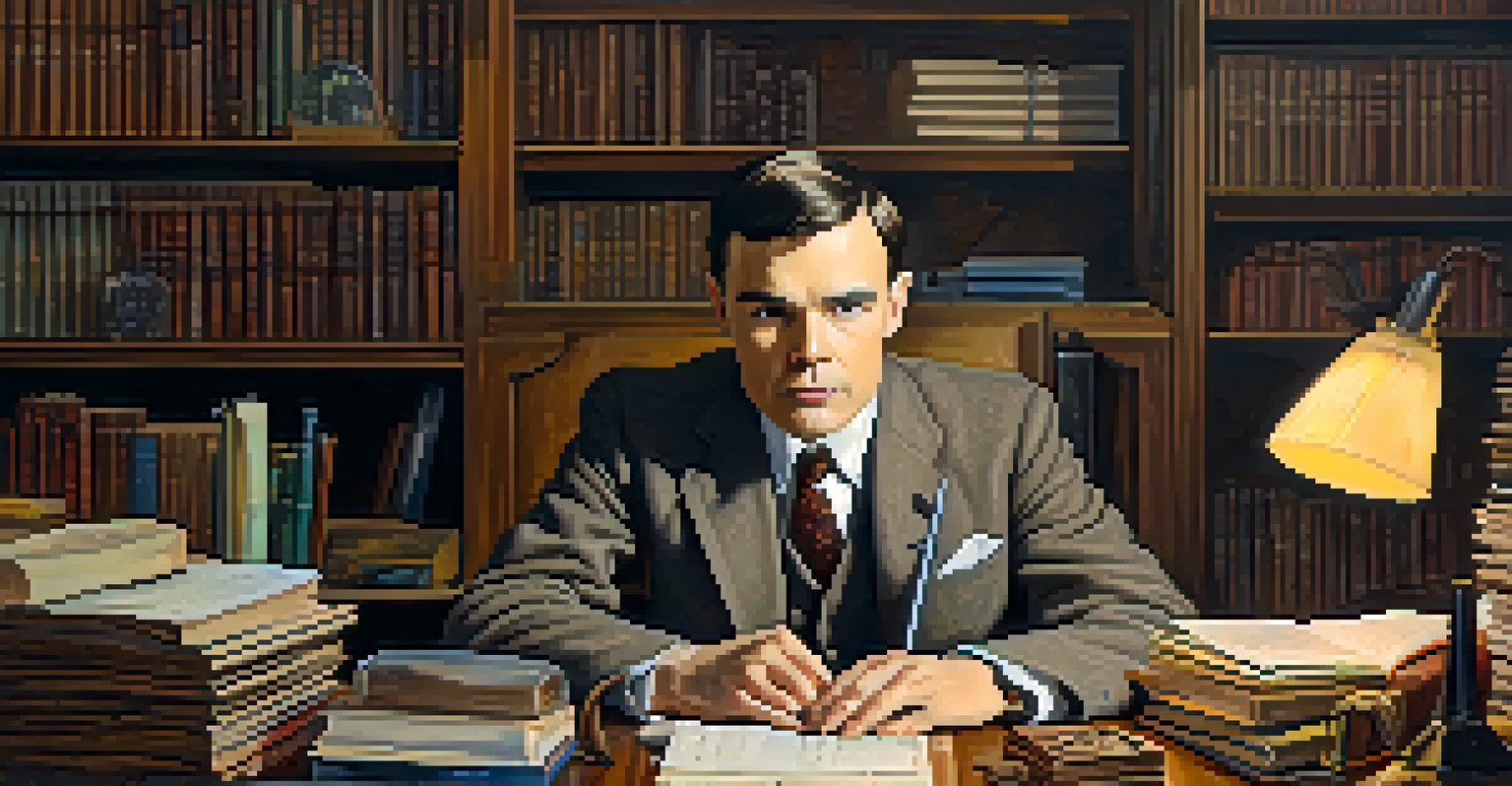Unpacking 'The Imitation Game': Alan Turing’s Real Story

Introduction to Alan Turing and His Impact
Alan Turing was a brilliant mathematician and logician whose work laid the foundation for modern computing. His contributions during World War II, particularly in breaking the Enigma code, played a crucial role in the Allied victory. Despite his monumental achievements, Turing's life was marked by tragedy and persecution, which adds complexity to his legacy.
We can only see a short distance ahead, but we can see plenty there that needs to be done.
The film 'The Imitation Game' dramatizes Turing's life, highlighting both his genius and the societal challenges he faced. While it brings attention to his contributions, it's essential to differentiate between cinematic liberties and historical facts. Understanding Turing's real story helps to appreciate the depth of his character and the significance of his work.
In this article, we will explore key aspects of Turing's life, the historical context of his work, and the impact of societal attitudes on his legacy. By unpacking 'The Imitation Game,' we aim to bring clarity to the remarkable yet troubled life of Alan Turing.
The Enigma Machine and Codebreaking
At the heart of Turing's wartime contributions was the Enigma machine, used by the Nazis to encrypt their communications. The complexity of the Enigma's encryption posed a significant challenge, requiring innovative approaches to decipher the coded messages. Turing developed the Bombe machine, a groundbreaking device that automated the decryption process and significantly sped up intelligence gathering.

Turing's work at Bletchley Park was not just about solving puzzles; it was a matter of life and death during the war. His efforts helped uncover key military strategies, leading to crucial victories. The urgency of the task underscored the importance of collaboration among a diverse team of codebreakers, which Turing navigated with remarkable skill.
Turing's Codebreaking Genius
Alan Turing's development of the Bombe machine was pivotal in deciphering the Enigma code, significantly impacting World War II.
However, the story of codebreaking is often oversimplified in popular narratives. While Turing played a pivotal role, he was part of a larger collective effort that included many unsung heroes. Acknowledging this broader context enriches our understanding of the codebreaking achievements during the war.
Turing’s Innovations in Computer Science
Beyond his wartime contributions, Alan Turing is often regarded as the father of computer science. His theoretical work laid the groundwork for the development of algorithms and computing machines. Turing's concept of the 'Turing machine' remains a fundamental model for understanding computation and algorithms.
Sometimes it is the people who no one imagines anything of who do the things that no one can imagine.
In his 1936 paper, 'On Computable Numbers,' Turing explored the limits of what machines could do, asking profound questions about intelligence and machine learning. This early inquiry into artificial intelligence foreshadowed many contemporary discussions about the role of computers in society. Turing's vision extended far beyond his era, making him a timeless figure in the field of technology.
However, despite his revolutionary ideas, Turing's contributions were not fully recognized during his lifetime. The world was not ready to embrace the implications of his work, which often put him at odds with societal norms. Reflecting on this tension helps us appreciate both his intellectual brilliance and his struggles against prejudice.
The Personal Struggles of Alan Turing
Turing's personal life was marked by challenges that starkly contrasted with his professional achievements. As a gay man living in a time when homosexuality was criminalized in the UK, Turing faced significant discrimination and societal rejection. This reality profoundly affected his mental health and sense of self-worth.
In 1952, Turing was prosecuted for his sexual orientation, leading to a tragic turn in his life. He chose chemical castration as an alternative to imprisonment, a decision that illustrates the painful choices he faced. The stigma surrounding his identity not only impacted his personal relationships but also overshadowed his remarkable contributions to society.
Turing's Legacy and Acceptance
Turing's remarkable contributions to computer science and artificial intelligence serve as a reminder of the importance of inclusivity and compassion in society.
Ultimately, Turing's story is a poignant reminder of the intersection between genius and vulnerability. Recognizing his struggles humanizes Turing and invites us to reflect on how society treats those who are different. It challenges us to advocate for acceptance and inclusivity in all areas of life.
The Legacy of Alan Turing
Alan Turing's legacy is multifaceted, encompassing his groundbreaking work in mathematics, computer science, and codebreaking. His contributions have had a lasting impact on our understanding of computation and artificial intelligence. Turing's ideas paved the way for the digital age, influencing countless technologies we rely on today.
However, Turing's story also serves as a cautionary tale about the consequences of intolerance and discrimination. His tragic end, often linked to societal rejection, highlights the need for greater acceptance and understanding of diverse identities. Turing's legacy is not just about his intellectual achievements but also about the importance of compassion and inclusivity.
Today, Turing is celebrated as a symbol of resilience and innovation. His story inspires ongoing discussions about diversity in STEM fields and the need to celebrate all contributions, regardless of background. By honoring Turing's legacy, we can strive to create a more inclusive future for all.
Cinematic Interpretations vs. Reality
While 'The Imitation Game' brings attention to Turing's life, it also takes creative liberties that can blur the lines between fact and fiction. For instance, the film simplifies complex historical events and relationships for dramatic effect, which can lead to misconceptions about Turing's character and contributions. It's crucial for viewers to approach such films with a critical eye.
Certain characters in the film are composites of real individuals, designed to amplify the narrative and create tension. While this storytelling technique can enhance emotional engagement, it often sacrifices accuracy. Understanding the difference between cinematic dramatization and historical accuracy helps viewers appreciate the nuances of Turing's life.
Cinematic vs. Historical Truths
While 'The Imitation Game' raises interest in Turing's life, it often simplifies and dramatizes events, highlighting the need for critical engagement with historical narratives.
Ultimately, films like 'The Imitation Game' can spark interest in historical figures, but they should serve as a starting point for deeper exploration. Engaging with credible historical accounts and resources can provide a fuller picture of Alan Turing's legacy and the true nature of his contributions to technology and society.
Conclusion: Honoring Turing’s Memory
Alan Turing's life story is one of brilliance, tragedy, and resilience. By unpacking the narrative presented in 'The Imitation Game,' we gain a deeper understanding of his contributions and the societal challenges he faced. Turing's journey reminds us of the importance of acceptance and the need to celebrate diverse identities in all fields.
As we reflect on Turing's legacy, we are called to recognize the ongoing struggles faced by those who differ from societal norms. His story encourages us to advocate for a world where everyone can thrive, free from discrimination and prejudice. The lessons we learn from Turing's life are invaluable as we move toward a more inclusive future.

In honoring Alan Turing, we must not only celebrate his achievements in mathematics and computing but also commit to fostering an environment that embraces diversity. By doing so, we ensure that his legacy continues to inspire future generations and that the injustices he faced will not be repeated.